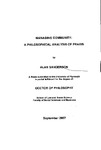MANAGING COMMUNITY: A PHILOSOPHICAL ANALYSIS OF PRAXIS
| dc.contributor.author | SANDERSON, ALAN | |
| dc.contributor.other | Faculty of Science and Engineering | en_US |
| dc.date.accessioned | 2013-09-10T09:41:45Z | |
| dc.date.available | 2013-09-10T09:41:45Z | |
| dc.date.issued | 2007 | |
| dc.identifier | NOT AVAILABLE | en_US |
| dc.identifier.uri | http://hdl.handle.net/10026.1/1617 | |
| dc.description.abstract |
If communities are to become a viable means of implementing social policy then community practitioners must individually examine their personal praxis. Therefore, in discovering a community's aims and objectives, a management model is needed that offers every practitioner a reflexive means of understanding peoples' beliefs, values, and attitudes. This proposition is critically examined through a philosophical framework that explores individuals' diverse perspectives on community, derived from their adherence to contending ontological and epistemological propositions about the social world, and its related ethical and motivational dimensions. Following a philosophical analysis, the taxonomy of social reality perspectives, developed by Dixon (2003) and Dixon and Dogan (2002; 2003a, b, c, d; 2004). is systematically used to explore the contending views on social reality. Thus, methodological configurations are associated with logical categories, (1) naturalist agency, underpinning the self-interested (free-riding) homo economicus\ (2) naturalist structuralism, underpinning the obligation driven homo hierarchus; (3) hermeneutic structuralism, underpinning the conversation-saturated homo sociologicus (Archer, 2000: 4); and (4) hermeneutic agency, underpinning homo existentialis. The disciplines of social psychology, ethics, and political science are employed to explore selected facets of human nature, moral principles, and political ideology chosen, by associates of each set of methodological configurations, in particular relational situations. Informed by this investigation a sample of community practitioners were questioned about their praxis. This reveals that a substantial majority understand and accept an objective and knowable social worid where people are self-interested. Therefore, these practitioners perceive community as a setting where they can influence the decisions of others through discourse and judge its ethical merits by the degree of loyalty and obligation extended to their projects. Thus, it is apparent that community practitioners should evaluate their praxis, through critical self-reflection, if they are to develop suitably robust and durable symbiotic relationships with adherents to each of the four social reality perceptions. This research leads to a new logic, based on the innovative interpretation of ontotogical and epistemotogical configurations offered in the seminal work of Bhaskar (1978 and 1979) and Archer (1989, 1995, 2000 and 2003). Here, an emerging social ontology informs the construction of more specific theories conceming the dynamics of community in identifiable localities. Therefore, it now becomes possible to construct a management model, incorporating contending social realities, the techniques of mediation and the results of changing cognition and cognitive dissonance, that facilitates community practitioner's critical self-reflection and construction of managerial strategies based on community member's contending perceptions of social reality. | en_US |
| dc.language.iso | en | en_US |
| dc.publisher | University of Plymouth | en_US |
| dc.title | MANAGING COMMUNITY: A PHILOSOPHICAL ANALYSIS OF PRAXIS | en_US |
| dc.type | Thesis | |
| plymouth.version | Full version | en_US |
| dc.identifier.doi | http://dx.doi.org/10.24382/3203 |
Files in this item
This item appears in the following Collection(s)
-
01 Research Theses Main Collection
Research Theses Main


